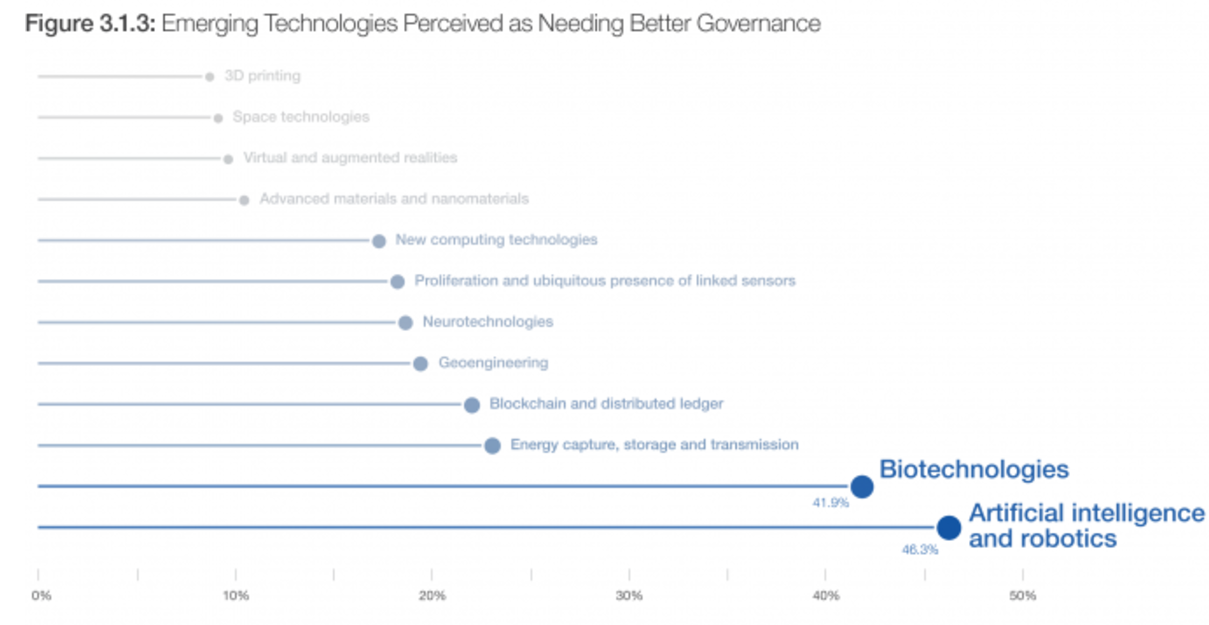Although he is on the cutting edge of new technology, Tesla founder Elon Musk has been sounding the alarm on artificial intelligence for some time. A recent survey from the World Economic Forum found a steady increase from 2013 to 2016 in media stories asking whether we should fear AI technologies. People relying on Musk and such coverage could understandably worry about the emergence of these new technologies.
Despite the dark narrative, the World Economic Forum finds that most people are optimistic about new technology. For each of the twelve emerging technologies included in the survey, respondents perceive that the benefits will outweigh any associated costs. Relatively few respondents believe these emerging technologies needed better governance. Furthermore, better governance does not necessarily mean more stringent regulation--it could entail a more stable and transparent regulatory framework that reduced the uncertainty facing entrepreneurs in these fields.
The relative lack of fear might be because concerns about massive job loss due to automation and new technology have not been borne out. A recent report from the Information Technology and Innovation Foundation found that the problem is not too much labor churn, but too little.
Looking at occupational trends from 1850 to 2015, the rate of occupational change has declined from a peak of over 50 percent from 1850 to 1870 to around 10 percent over the past 15 years. This is the opposite of what we would expect to see if new technologies really were disrupting labor markets to the extent the coverage often depicts.
The average score for the perceived possible benefits these technologies could deliver to society on a scale from 1 to 7 was 5.56, compared to only 3.8 for negative consequences, with substantial variation between the different technologies. Fewer people were worried about the risks of space technologies or 3D printing. At the same time, the perceived benefits for these two were lower than some of the other options.
Biotechnologies and artificial intelligence were deemed “high stakes,” with high scores for both benefits and negative consequences.

Source: World Economic Forum.
Other technologies, such as energy capture, storage and transmission, are perceived as being low risk and high reward. People are not concerned about disruption or the regulatory landscape, but do believe these areas could deliver substantial benefits.
These perceptions influence how respondents think about the governance of each of these emerging technologies. Perhaps unsurprisingly, biotechnologies and artificial intelligence scored the highest when people were asked to list three choices the highest need of better governance, at 42 percent and 46 percent, respectively. At the other end of the spectrum, fewer than 10 percent of respondents listed 3D printing.

Source: World Economic Forum.
Better governance does not necessarily mean stricter regulation. As the World Economic Forum explains, developing the right regulatory framework is complex: “overly strict restrictions on the development of a technology can delay or prevent potential benefits. But so can continued regulatory uncertainty.” An area that is still in regulatory limbo adds a layer of uncertainty for investors. They might fear that what had up to then been a permissive sector could change overnight, rendering their product unviable or even illegal.
The contrast between the two technologies most given as needing better governance conveys the concern people have about different regulatory risks. Biotechnologies, which encompass genetic engineering, sequencing, and therapeutics, is a highly regulated area, and has been a subject of global governance since the Convention on Biological Diversity was ratified by the United Nations a quarter century ago. The Convention’s articles established a set of principles for signatories in creating protocols and processes for the use of biotechnology. Burdensome regulation could deter further innovation that would deliver sizable benefits in a more permissive framework. The difficulty in calculating these foregone benefits and innate aversion to new disruptions might lead to scenarios where new technologies are overly regulated as a precaution by default.
Unlike biotechnologies, AI does not have a developed regulatory framework in most parts of the world. In part this is because AI and robotics more broadly does not fit into a narrowly defined category as neatly as biotechnologies does. Instead, AI performs functions in a host of different areas, each with a pre-existing regulatory structure. Developments in AI will render many of these regulations obsolete, as they were designed with a much different landscape in mind. This could lead to problems autonomous cars, for example.
One misstep or accident might lead to widespread distrust and a rush to impose tighter regulations that could stifle further innovation.
Despite the prevailing narrative that people look with trepidation at these emerging technologies, respondents were more optimistic about every one of the 12 technologies included in this survey. They think these new developments could make their lives significantly better, while recognizing that there are some risks. Focusing on transparent, adaptive governance for these technologies could help ensure the widespread optimism about the potential for these emerging technologies is not misplaced.
Charles Hughes is a policy analyst at the Manhattan Institute. Follow him on twitter @CharlesHHughes.
Interested in real economic insights? Want to stay ahead of the competition? Each weekday morning, E21 delivers a short email that includes E21 exclusive commentaries and the latest market news and updates from Washington. Sign up for the E21 Morning Ebrief.
